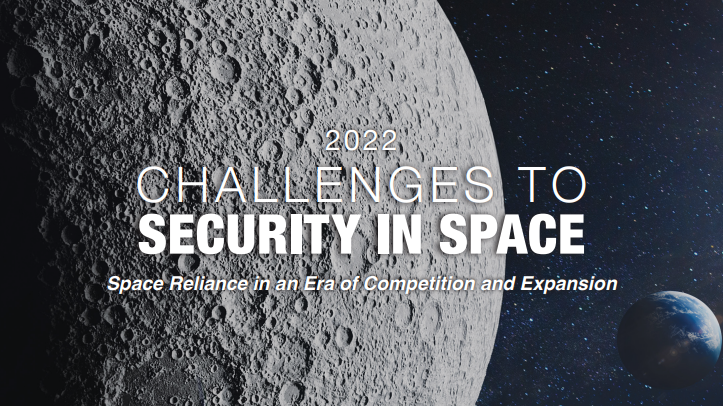
The cover of the report compiled by U.S. Defense Intelligence Agency, March 2022. /Screenshot via dia.mil
The cover of the report compiled by U.S. Defense Intelligence Agency, March 2022. /Screenshot via dia.mil
Editor's note: Hannan Hussain is a foreign affairs commentator and author. He is a Fulbright recipient at the University of Maryland, the U.S., and a former assistant researcher at Islamabad Policy Research Institute. The article reflects the author's opinions and not necessarily the views of CGTN.
On April 12, the Pentagon's Defense Intelligence Agency (DIA) issued a report alleging Beijing's involvement in developing and deploying weapons that can attack U.S. satellites, while blaming China for challenging "the U.S. position in the space domain." "Beijing and Moscow seek to position themselves as leading space powers, intent on creating new global space norms," states the 2022 Challenges to Security in Space report. "Through the use of space and counter-space capabilities, they aspire to undercut U.S. global leadership," it adds.
Washington's militarization of space is no secret. The controversial U.S. Space Force has been a mainstay of that effort, challenging global security by creating surveillance networks deemed necessary for national security. With that backdrop in mind, the U.S. should not come up with such unfounded warfighting allegations against Beijing and take stock of it's own push to proliferate arms at the expense of international space security.
It is true that Beijing's economic and technological skills have helped expand its space program to remarkable frontiers of innovation. And that shows in China's increased annual launches and the number of satellites successfully launched into orbit. It is a striking revelation of U.S. insecurities, then, for the Pentagon to frame China's innovation spirit as one that indicates development of weapons to "deny adversary space capabilities" and use them "against satellites." Quite to the contrary, leading U.S. military strategists themselves have challenged outer space freedoms by treating that space as fertile for controversial military operations.
Consider the multi-million dollar addition to U.S. military space projects in March: the Congress-led addition was characterized by Eric Felt, commander of the Air Force Research Laboratory's Space Vehicles Directorate, as just "putting the toe into the water." Now, Deputy Secretary of Defense Kathleen Hicks is keen to ramp up support from a declining defense-industrial base to bolster Washington's space hegemony, despite the value afforded to taxpayers being noticeably low.

United Launch Alliance Delta IV-Heavy rocket is launched from pad 37B at Cape Canaveral Air Force Station in Florida, December 10, 2020. /VCG
United Launch Alliance Delta IV-Heavy rocket is launched from pad 37B at Cape Canaveral Air Force Station in Florida, December 10, 2020. /VCG
Even more telling is the timing of the report. The Pentagon has eyes set on its proposed fiscal 2023 defense budget, a proposal that will benefit through inflated U.S. threat perceptions in space. On the regional front, a confrontational reading of space power projection saw the U.S. partner with Australia on space defense. It is unsurprising that a self-identified China "threat" contributed to that consensus.
Concerns have also been raised about the peaceful nature of Washington's space militarization efforts, given that the U.S. Space Force virtually ensured NASA accepts the former's seemingly boundless sphere of territorial influence in space. What stands blurred is the valuable distinction between what constitutes peaceful exploration, and what will quality as a violation.
Finally, another major contribution to disinformation in the report is the People's Liberation Army (PLA)'s alleged reliance on "overt and covert acquisition of foreign space and counter space technologies" to aid China's knowledge, technological modernization and domestic research. Preposterous accusations of China embracing "technical espionage and cyber-espionage" only underlines the degree to which the U.S. is distorting China's inclusive and peaceful approach to outer space cooperation, as it seeks to pursue a path to the contrary.
By the report's own admission, pursuits to take weaponization out of space agreements in the United Nations are pursued by Beijing and Moscow. At the heart of these pursuits lies the Treaty on the Prevention of the Placement of Weapons in Outer Space and of the Threat or Use of Force Against Outer Space Objects (PPWT). The PPWT seeks to address a fundamental contradiction by making sure that the space security aspirations of countries are not undercut by "the hegemonic doctrine" of one superpower to seek military and strategic advantage.
Thus, the Biden administration's reluctance to go for any meaningful form of space arms control agreement is a powerful message on letting its arms proliferation in space continue unbothered. It is also understandable: The Pentagon's desire to secure major investments for its U.S. Space Force and Space Command would suffer if the U.S. was to end its military adventurism in space and acknowledge the peaceful contours of select countries' space programs – chiefly China.
(If you want to contribute and have specific expertise, please contact us at opinions@cgtn.com. Follow @thouse_opinions on Twitter to discover the latest commentaries on CGTN Opinion Section.)

